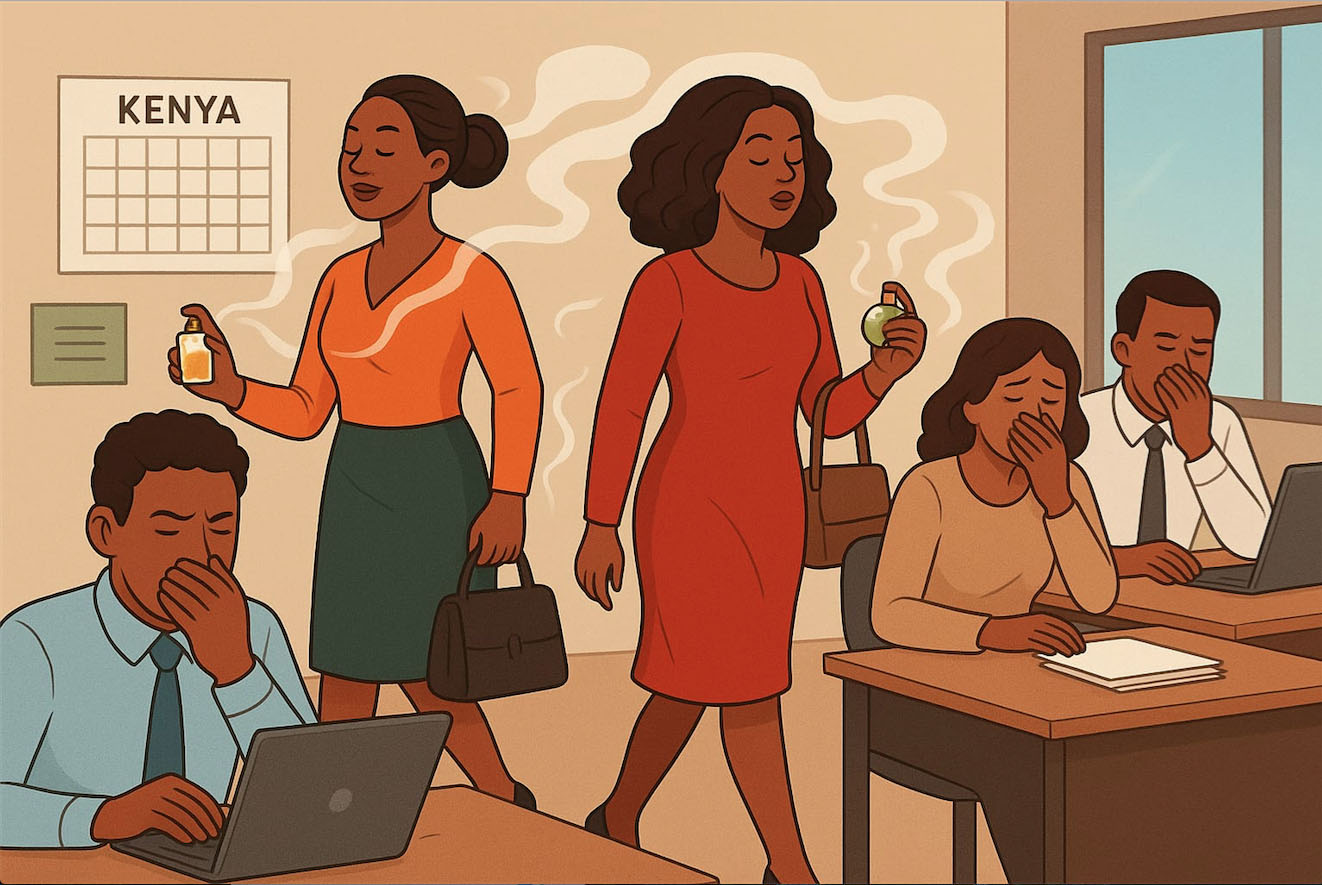
It is 8.45am in a cramped Nairobi office. The day begins like any other until a colleague, let’s call her Brenda, arrives.
She is trailed not only by her handbag but also a cloud of perfume so thick, it deserves its own payroll number.
Within minutes, colleagues are coughing, their eyes watering. The office fan bravely redistributes the fragrance like tear gas at a Gen Z protest in downtown Nairobi.
The politics of scent in the workplace rarely makes it into office safety board meetings, yet experts warn that strong perfumes are more than a nuisance.
For those with asthma or fragrance sensitivities, exposure can bring immediate symptoms, like coughing, wheezing, headaches, nausea and irritated eyes.
The American Academy of Allergy, Asthma and Immunology notes that this is not a matter of personal taste, it is a genuine health trigger.
Perfumes contain volatile organic compounds, or VOCs, that linger in the air. In poorly ventilated rooms, they can elevate indoor pollution levels beyond what is found outdoors.
They may seem like a romantic notion but can leave colleagues longing for Nairobi traffic fumes instead.
The social dilemma is equally thorny. Wearing perfume is often linked to personal style, culture and confidence. But when one worker’s Chanel collides with another’s lungs, the human resource department should step in.
Globally, many bodies have quietly taken sides. The Society for Human Resource Management provides sample policies discouraging heavy scents, while the American Lung Association offers template language for employers who want fragrance-free spaces.
The US Centers for Disease Control has even recommended such policies in workplace evaluations.
It is a debate that has left some employers pinning humorous signs as a light-hearted nudge toward civility, such as: If your scent enters the room before you do, please register it at reception.
In Kenya, no law exists that explicitly bars staff from wearing perfumes at work. The Occupational Safety and Health Act of 2007, however, requires employers to keep workplaces safe and healthy.
That includes rules on ventilation, spacing and the control of “fumes” or other air pollutants. The law does not name perfume, but legal experts suggest that flooding a sardine-can office with an overpowering fragrance could, at least in principle, fall within its reach.
For employers keen to avoid disputes, the safer route is internal policy. A company can ask workers to “go light” on perfumes, ban plug-in air fresheners, and stock fragrance-free soaps and cleaning agents.
Such moves may not inspire poetry, but they do prevent migraines.
The practice has already been tested in the West. Hospitals in the US, some universities in European countries and government departments in Canada have imposed fragrance-free policies after staff complaints.
These institutions argue that productivity rises when people are breathing freely rather than wheezing through their daily work. And in a world of hybrid working, it is hard to justify losing staff hours to what is, essentially, scented air pollution.
Yet perfume is not only chemical, it is cultural. In Nairobi, where style and presentation carry weight, banning fragrance altogether could provoke resistance.
The delicate balance, therefore, lies in humour and education. One HR officer jokingly advised her staff to “wear your cologne like you wear your tie: office-appropriate, not nightclub volume”.
Another company circulated a memo explaining that heavy scents could trigger asthma and allergies, appealing to empathy rather than authority.
The mix of medical evidence and social persuasion often works better than perfume police at the door.
Back in that small Nairobi office, Brenda is still blissfully unaware that her perfume could one day feature in an occupational safety case study.
Her colleagues, meanwhile, dream of oxygen masks and hazard allowances. Until Kenya drafts a Perfume Control Act, the reality remains that survival in tight office spaces will depend on ventilation, diplomacy and a dash of humour.
After all, the only thing that should leave employees breathless is a surprise salary increment or bonus, not a colleague’s perfume.











